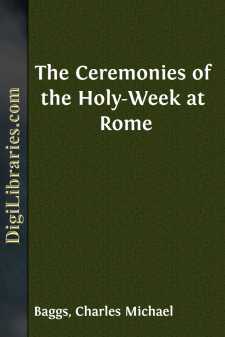Categories
- Antiques & Collectibles 13
- Architecture 36
- Art 48
- Bibles 22
- Biography & Autobiography 813
- Body, Mind & Spirit 142
- Business & Economics 28
- Children's Books 17
- Children's Fiction 14
- Computers 4
- Cooking 94
- Crafts & Hobbies 4
- Drama 346
- Education 46
- Family & Relationships 57
- Fiction 11829
- Games 19
- Gardening 17
- Health & Fitness 34
- History 1377
- House & Home 1
- Humor 147
- Juvenile Fiction 1873
- Juvenile Nonfiction 202
- Language Arts & Disciplines 88
- Law 16
- Literary Collections 686
- Literary Criticism 179
- Mathematics 13
- Medical 41
- Music 40
- Nature 179
- Non-Classifiable 1768
- Performing Arts 7
- Periodicals 1453
- Philosophy 64
- Photography 2
- Poetry 896
- Political Science 203
- Psychology 42
- Reference 154
- Religion 513
- Science 126
- Self-Help 84
- Social Science 81
- Sports & Recreation 34
- Study Aids 3
- Technology & Engineering 59
- Transportation 23
- Travel 463
- True Crime 29
The Ceremonies of the Holy-Week at Rome
Categories:
Description:
Excerpt
CHAP. I.
ON THE CEREMONIES OF THE MASS
CONTENTS.
Origin of the word ceremony—object of ceremonies—institution of the mass—its earliest ceremonies—discipline of secrecy—liturgy of the Roman church—general review of the principal ceremonies of the mass—mass of the catechumens, ambones—mass of the faithful, blessed water, secrecy, prayers for the dead—Latin the language of the Roman liturgy, and why—usual ceremonies of high-mass in the papal chapel—sentiments of S. John Chrysostom.
"It was chiefly, if not only, in the mystical liturgy of the eucharist, that the primitive church spoke without reserve of all the sublimities of Christian faith." Palmer, Origines Liturg. vol. I, p. 13.
Origin of the word ceremony.
From Rome our Saxon forefathers received Christianity; and from the same source we have derived several words denoting Christian rites. Thus the words religion, sacrament, sacrifice, communion, and others are Latin, with the exception of the termination. The word ceremony also is Latin, and owes its origin to an interesting fact in ancient Roman history. When the Capitol was besieged by the Gauls (A.U. 365) most of the inhabitants of Rome provided for their own safety by flight: but the Flamen Quirinalis or priest of Romulus, and the Vestal virgins loaded themselves with the sacred things, that they might secure those hallowed treasures from profanation. "They were proceeding" (says Livy lib. V, c. XXII) "along the way which passes over the Sublician bridge, when they were met on the declivity by L. Albinus a plebeian, who was fleeing with his wife and children in a plaustrum or cart: he and his family immediately alighted: then placing in the cart the virgins and sacred things he accompanied them to Cære where they were received with hospitality and respect". Hence (says Valerius Maximus lib. I, c. 1.) "sacred things were called ceremonies, because the inhabitants of Cære revered them when the republic was broken, as readily as when it flourished". Thus is the word ceremony associated at once with the devotion of Albinus, with the Gaulish invasion of the Capitol, and with Cære, one of the twelve cities of Etruria, now called Cervetri or Cære vetus. The Pagan Romans derived their religious rites from Etruria, and in particular from Cære on account of its proximity to Rome: this may be another reason for the adoption of the term ceremony, which was afterwards applied to the rites of all religions.
Object of ceremonies.
But what, it may be asked by many, is the use of ceremonies? I shall answer in the words of the council of Trent. "Since the nature of man is such, that he cannot easily without exterior helps be raised to the meditation of divine things, the church as a pious mother has instituted certain rites, namely, that some things in the mass should be pronounced in a low voice and others aloud; she has also used ceremonies, as mystical benedictions, lights, incense, vestments, and many other things of that kind, from apostolical tradition and discipline, in order that the majesty of so great a sacrifice might be displayed, and the minds of the faithful might be excited by these visible signs of religion and piety to the contemplation of those sublime things which are concealed in this sacrifice"....


